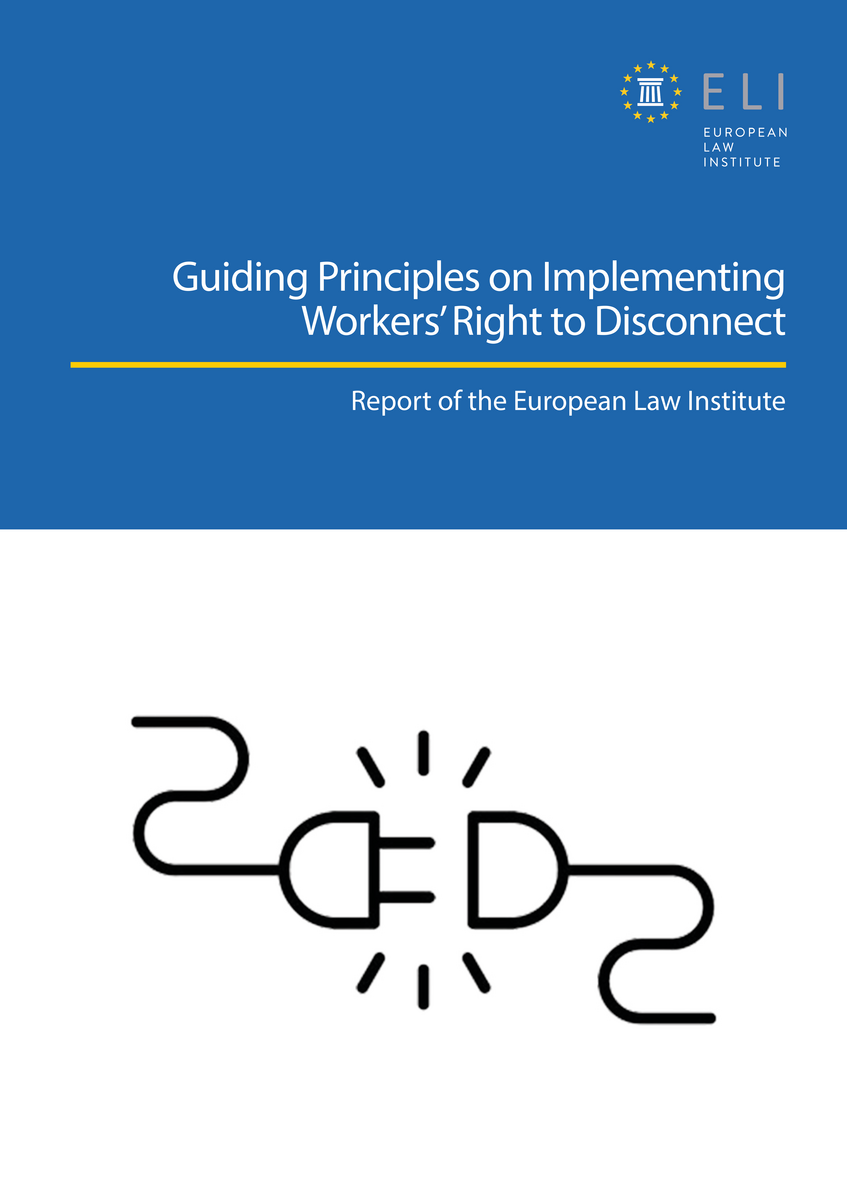ELI Guiding Principles on Implementing Workers' Right to Disconnect
Quick Facts
Project Type: Principles
Procedure: Accelerated
Adopted: CD 2022/14
Project Period: July 2022–October 2023
Events
An overview of past and upcoming events of this project is available here.
Press Review
An overview of press reviews on this project is available here.
Translations
The following version is available: Spanish
Summary
ELI's ten Guiding Principles aim at supporting legislators and social partners at striking a balance between the conflicting rights of employers and employees, at a time of increasing use of digital and technological tools. At the core of the Principles is a desire to protect the physical and mental health of all workers, by guaranteeing resting time and improving the predictability of working schedules.
Background
The massive use of IT at work led to an unprecedented increase of the recourse to telework and other work arrangements where the physical workplace is replaced by a virtual one. Carrying out activities outside traditional workplaces meant for most workers in developed economies to work from their own residence, with an evident impact on private life, including on the way family life is ordinarily organised. Research shows that people working from home are more than twice exposed to the risk of working longer than the admissible maximum weekly working hours, which according to EU law is 48 hours per week. Not only have working hours become longer, but also working tasks literally invaded private life-spaces, including the time spent with family, relatives, and friends, which is typically meant to allow individuals to enjoy their life outside work.
Digitalisation of workplaces was boosted by the restrictions imposed during the Covid-19 sanitary crisis. While this allowed a number of jobs to survive, it also required flexibility and adaptation by the workforce. Such restrictions did not impact all jobs or all economic sectors evenly. Those working in tertiary jobs in particular (i.e., performed in the services sector) were able to continue working despite physical restrictions.
Domestic legislation reacting to restrictions, which raised delicate legal issues concerning inter alia applicable fiscal provisions, social security and safety at work, was mainly focused on enabling workers to carry out their activities from their residence. But pandemic legislation was temporary in nature, and most provisions are no longer in place, while telework is still encouraged in most countries.
Social partners themselves contributed to establishing tailored-made rules, applicable to specific sectors and/or specific establishments.
The law remained somehow in the background, since most national parliaments hesitated to introduce structural reforms. Notable exceptions are Belgium and France, where the law introduced specific rights to work from home and a correspondent right to collective bargaining on issues related to disconnection from work. Other members States such as Spain do not impose a duty for social partners to negotiate on the right to disconnect but introduced an obligation for employers to implement the right to disconnect in their companies, either through an agreement with trade unions/employees’ representatives or through a charter (after consultation with the workers’ representatives). As of January 1, 2022, Portuguese law expressly prohibits employers from contacting their employees outside of working hours. A breach of this rule is considered a serious misdemeanour.
It is uncertain the way other Member states will regulate (if at all) those issues at domestic level. And despite an express encouragement from the EU Parliament to the Commission to intervene in the field, EU law is silent on the right to disconnect. Even the recent directive (2019/1158) on work-life balance does not provide any specific measure to let workers disconnect from work.
This uncertainty calls for a mobilisation of forces in the direction of providing policy makers with a viable set of principles derived from international and EU law, which could guide their regulatory action.
Aim
The proposed project will look at existing regulatory initiatives and elaborate on a set of fundamental principles which can guide legislators and social partners to strike a balance between conflicting rights, to ensure information at individual and collective level, and to promote private enforcement of the right to disconnect.
They will serve as a legal basis both for the EU and domestic legislators, which would find in them an ideal blueprint for any regulation of the right to disconnect.
Outcome
The project aims at elaborating guiding principles to implement the right to disconnect.
Such guiding principles will benefit from a comparative assessment of some important jurisdictions in Europe (through legal analysis and doctrinal desk-research), while also taking stock of on-going research projects on the very same topic (e.g., W@W project at the University of Luxembourg). The role of case law will be limited in the elaboration of the proposed guiding principles, since very few decisions have been published on the topic and the place of legislators seems predominant.
A qualitative point would also be that the guiding principles will respect the reciprocal regulatory competences of the law and collective bargaining agreements, thus enhancing the role of social partners in the implementation of legislative measures.

